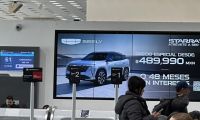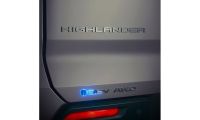Preliminary results of the Study showed that up to a 25 percent decrease in fuel consumption (i.e., up to 33 percent increase in MPG) was achievable with an SSC engine replacing the Sentra’s engine when factoring in fuel cutoff during deceleration and idle in the model.
Results also showed that up to 35 percent decrease in fuel consumption (i.e., up to 54 percent increase in MPG) was achievable when compared to the model Nissan Sentra using a stock engine without fuel cutoff.
For the record, Scuderi always stated on its website that by optimizing the split-cycle concept, the engine when fully developed will reduce NOx emissions up to 80 percent and improve fuel efficiency by 50 percent, compared to a conventional gasoline engine.
Looking back to SAE interview
The primary purpose of this reporter’s interview with Sal Scuderi last month at the SAE 2011 World Congress in Detroit was to uncover the potential of the split-cycle engine in terms of miles per gallon. In other words, I wanted to know just how much gas mileage could the Scuderi engine achieve? And, more specifically was it capable of competing with electric hybrids on mileage and cost?
Unfortunately, Mr. Scuderi could not answer specifically, because the test simulations for mileage were still in process, plus every mileage number is subject to vehicle class. However, when I asked him generically IF we would ever see 50-plus mpg from an internal combustion engine, Mr. Scuderi did not hesitate to answer.
In fact, Mr. Scuderi replied quickly with a resounding, yes; implying, of course, that the engine of choice would have to be a Scuderi split-cycle air hybrid, turbocharged to take advantage of the Miller Cycle effect.
Concerning cost, the Scuderi split cycle engine would be cheaper to mass produce than the expensive and heavy lithium-ion batteries. Futhermore, the air hybrid would also allow regenerating braking, plus the ability to get Miller Effect effciency on fuels whose infrastructures are already in place, like gasoline, diesel and natural gas..
Now, more specific results are in with the simulation study, along with the ability to compare other engines as benchmarks. According to the Scuderi news release, simulations show Scuderi Engine reduces a 2011 standard Sentra’s fuel consumption by up to 35 Percent.
For the record, the Sentra model was simulated through a standardized Federal Test Procedure-75 (FTP-75) drive cycle for each SSC engine design.
Will the Scuderi engine ever beat electric hybrids?
All we can do at this point is compare via computer simulations. Recall we had the same debate over the real gas mileage and electrical driving range of the Chevy Volt. Point is, all new engines and propulsion systems suffer through this process.
Historically, how much we can expect from a new engine design has been a difficult question to answer, because it is dependent on the type of vehicle the engine is placed in and the route driven, often referred as the drive cycle. That is precisely why Scuderi Group commissioned the independent lab to design and implement the computer Study, which could simulate an SSC engine in any vehicle of choice, driven through any drive cycle of choice.
Results would then be compared to the same vehicle driven with its factory engine through the same drive cycle. The Nissan Sentra was the first vehicle chosen for the Study, due to its competitive mileage and popularity.
At the onset of the Study, a computer baseline model of the Sentra was established, which closely matched the measured performance of the actual 2011 Nissan Sentra. The lab mounted the Nissan Sentra on a chassis dynamometer and drove the vehicle through the FTP-75 drive cycle to generate the benchmark data. Various SSC engine models were sized to match the acceleration and power of the Sentra’s conventional engine. Each Scuderi engine was then placed into the baseline Sentra vehicle and driven, via computer simulations, through the same FTP-75 drive cycle.
Results were compared to the Sentra when operating with its conventional engine. The most favorable results were obtained using a preliminary model of the turbocharged SSC engine with a downsized compression cylinder configured to operate in air-hybrid modes.
“These results continue to verify the real-life applicability of our engine design,” said Sal Scuderi, president of Scuderi Group. “At every step in the development and testing of our engine, we continue to see additional fuel efficiency gains. Our split-cycle configuration is creating the basis for implementing additional propulsion advances that move beyond conventional engine design.”
Scuderi Group will provide more in-depth details on the results of the Nissan Sentra Study at the Engine Expo 2011 in Stuttgart, Germany, May 17-19.
More information on the Scuderi Engine is also available by visiting online at www.ScuderiEngine.com. To hear an audio podcast of Stephen Scuderi, vice president and patent attorney, discussing the Nissan Sentra study, go to www.ScuderiEngine.com/NissanStudy.
-----------------------
About the Author: After 39 years in the auto industry as a design engineer, Frank Sherosky now trades stocks and writes articles, books and ebooks via authorfrank.com, but may be contacted here by email: [email protected]
________________________________________________
Additional Reading:
Scuderi says 50-plus mpg achievable with turbocharged split-cycle air-hybrid engine
Scuderi Air-Hybrid Engine technology setting up to challenge electric hybrids
EPA sets milestone for alternate fuel industry with regulation amendments
Buick LaCrosse with eAssist on par with highway fuel economy of compacts
Cella Energy achievement may make hydrogen fill-up a reality
Stop-start technology to advance more micro hybrids by 2016
Four alternate engine technologies for 2011 and beyond
Set as google preferred source











Comments
Frank, enough about how great
Permalink
Frank, enough about how great the engine is! We get it. How about contacting some OEM's and reporting on why they are not signing with the supposed best technology in the room?